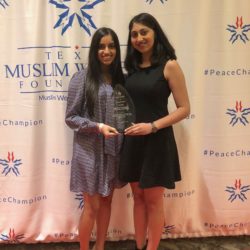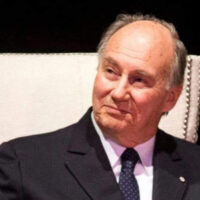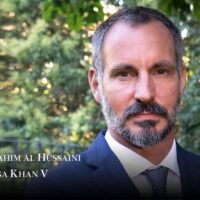
Sarah Habib and Alisha Somani are co-presidents of the Aga Khan Foundation Youth Ambassadors in the Dallas area, and seniors in high school. Recently they spoke with us about the group’s local programs, aspirations, and public recognition they have received.
The Youth Ambassadors are high-school students who engage with issues of local and global importance, both in dialogue and action. As volunteers for the Aga Khan Foundation, the Dallas Youth Ambassadors are inspired by the way AKF partners with communities internationally. The Ambassadors have organized ways for young artists and innovators to apply their knowledge and passion for change in a practical and globally minded way. In October 2018, the Youth Ambassadors received an award from the Texas Muslim Women’s Foundation recognizing them as “peace champions in our community and making the community better for all people.”
Achieving Recognition
Alisha Somani: Representatives of the Texas Muslim Women’s Foundation noticed our work, including the Youth Ambassadors’ outreach, global village exhibits at the Dallas Walk-Run for Aga Khan Foundation, and the Youth Summit. They bestowed their award to the Youth Ambassadors in October 2018.
Sarah Habib: The Foundation gave the awards at their first fundraiser where they recognized the Youth Ambassadors for local projects, as well as for our outreach initiatives through creative arts and innovative challenge competitions.
Starting Early with Youth Ambassadors
Sarah: I was always a talkative child. I got involved with the AKF Walk-Run when I was in first grade. I would read whatever scripts the event organizers gave me. But I didn’t really understand AKF’s work until I joined Youth Ambassadors. When I was in seventh grade, my brother encouraged me to join.
Youth Ambassadors is a unique opportunity to engage with issues of global importance at a young age. It was a great experience to research and share AKF’s work and write my own scripts. I went on to serve as Outreach Officer and then became Co-President in charge of Outreach.
Alisha: I got involved in a similar way, through the Village exhibit at the Walk-Run, like Sarah. But working with Youth Ambassadors is what really drew me in. The local projects adapt the AKF approach to engage with local communities on their priorities, starting with a local needs assessment. The process is a step toward making a meaningful change, and powerful to experience. In time I came to serve as Co-President for Projects.
Memorable Local Connections
Alisha: One of our most memorable recent projects has been with nearby Forman Elementary School, a Title-1 school with a high concentration of low-income families. There we met with the principal and teachers to learn about their priorities for their students. Out of that discussion we began working with the Beautiful Me group, girls in grades 4 and 5. (According to its website, Beautiful Me has a “focus on developing leadership skills, acceptance of others and a positive self-esteem,” with an aim “to develop the next female leaders in our country.”)
Beautiful Me wanted to figure out how to get the girls, most of whom didn’t have college graduates in their families, to think about attending college. We planned and held some workshops with the Beautiful Me girls, focused on how they could approach taking courses in middle school that would help them grow and pursue their passions.
From the workshops, the girls then engaged with an art activity: creating a ceiling tile for Forman. It was a great way to have them express to peers their dreams and who they were. That program involved about 25 girls. It required a lot of time spread over nearly a year, from the first planning meetings and needs assessment in mid-2017 to the workshops and ceiling-tile project in spring 2018.
Now we’re planning to return to Forman and host a reflections session to hear from them and make sure these girls have the capacity to pursue a path to college. That means exploring the world of scholarships and applications so that higher education becomes a possibility for each and every girl.
Alisha: Maybe the most memorable part came in seeing their aspirations expand. When we started, we asked the girls what they wanted to do in their lives. One said she liked coffee so she wanted to be a barista at Starbucks. By the end of the workshops, she had seen her possibilities open up. She said she wanted to become an entrepreneur and start her own coffee shop.
Sarah: Being able to reach out to these girls at such a formative phase is really powerful.
Former Youth Ambassadors Inspire and Mentor
Sarah: The YA generation before ours was really welcoming by helping us transition into the leadership positions they once held. Now they are expanding our Youth Ambassador platform across the university level. Alisha’s older sister, Aliya Somani, was a big inspiration. And my older brother, Zanir Habib, was another.
Sanya Khan was another important person in that older group who was important to our concept of Local Action fueling Global Thinking. Working with these mentors has been really developmental.
The sense of community among Youth Ambassadors is so important. Group Chat allows us to share what’s going on in our lives, and informally we text and call a lot.
Alisha: We describe Youth Ambassadors as high-school students, but once you’re an Ambassador you’re always an Ambassador. We don’t even have to ask the graduates to come back and mentor us. They want to stay involved. What we’re doing in the Dallas-Fort Worth area is what they want to see expanded nationally.
Sarah: Through my work with Youth Ambassadors, I’ve discovered the power of hope and engagement. It inspired my brother and I both to pursue engineering. Zanir is studying at Johns Hopkins. We’re looking at how we can use our technical education to improve the quality of life and break the cycle of poverty.
Alisha: My sister is studying international relations at Princeton and is involved in ways to foster a pluralistic society. Amsal Madhani, our former arts coordinator, spent time with a hospital in India that inspired her to study neuroscience toward becoming a doctor after graduation.
Sarah: Our work with AKF and Youth Ambassadors has influenced our visions for change. My vision for change is education as a driver for hope. My vision is that in 20 years, the next generation will form an international knowledge society, using education to solve the problems of their time.
Alisha: My vision for change is to improve people’s quality of life by establishing trust and responsibility in all communities. Not just tolerate each other but to make meaningful connections, to foster a pluralistic society.
Youth Summit Moving Forward
Sarah: We’d also like to highlight our annual Youth Summit coming this March. The summit started with the art exhibit and has grown into a platform by and for young people.
The Summit will bring together the three initial strands of our work—the competitions in art, spoken word, and innovative solutions—but will also serve as a platform to bridge local and global action that brings meaning and change.
This post is part of the #humansoftheworld series on our blog—a collection of tales we can both relate to and marvel at. Here, we share stories of appreciation, self-reliance, and strength from across the Aga Khan Development Network.


